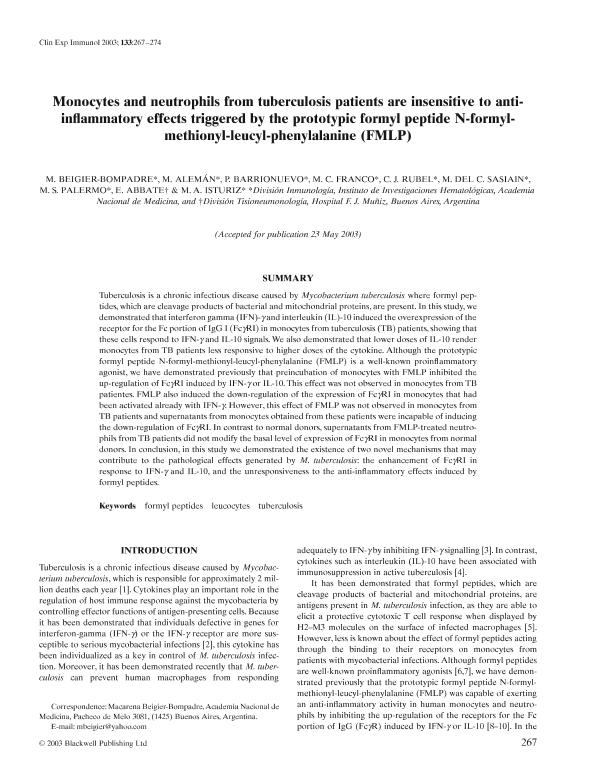Artículo
Monocytes and neutrophils from tuberculosis patients are insensitive to anti-inflammatory effects triggered by the prototypic formyl peptide N-formyl-methionyl-leucyl-phenylalanine (FMLP)
Beigier-Bompadre, Macarena; Alemán, Mercedes; Barrionuevo, Paula ; Franco, Marcela Carolina; Rubel, C.J.; Sasiain, María del Carmen
; Franco, Marcela Carolina; Rubel, C.J.; Sasiain, María del Carmen ; Palermo, Marina Sandra
; Palermo, Marina Sandra ; Abbate, E.; Isturiz, Martín Amadeo
; Abbate, E.; Isturiz, Martín Amadeo
 ; Franco, Marcela Carolina; Rubel, C.J.; Sasiain, María del Carmen
; Franco, Marcela Carolina; Rubel, C.J.; Sasiain, María del Carmen ; Palermo, Marina Sandra
; Palermo, Marina Sandra ; Abbate, E.; Isturiz, Martín Amadeo
; Abbate, E.; Isturiz, Martín Amadeo
Fecha de publicación:
08/2003
Editorial:
Wiley Blackwell Publishing, Inc
Revista:
Clinical and Experimental Immunology
ISSN:
0009-9104
Idioma:
Inglés
Tipo de recurso:
Artículo publicado
Clasificación temática:
Resumen
Tuberculosis is a chronic infectious disease caused by Mycobacterium tuberculosis where formyl peptides, which are cleavage products of bacterial and mitochondrial proteins, are present. In this study, we demonstrated that interferon gamma (IFN)-γ and interleukin (IL)-10 induced the overexpression of the receptor for the Fc portion of IgG I (FcγRI) in monocytes from tuberculosis (TB) patients, showing that these cells respond to IFN-γ and IL-10 signals. We also demonstrated that lower doses of IL-10 render monocytes from TB patients less responsive to higher doses of the cytokine. Although the prototypic formyl peptide N-formyl-methionyl-leucyl-phenylalanine (FMLP) is a well-known proinflammatory agonist, we have demonstrated previously that preincubation of monocytes with FMLP inhibited the up-regulation of FcγRI induced by IFN-γ or IL-10. This effect was not observed in monocytes from TB patientes. FMLP also induced the down-regulation of the expression of FcγRI in monocytes that had been activated already with IFN-γ. However, this effect of FMLP was not observed in monocytes from TB patients and supernatants from monocytes obtained from these patients were incapable of inducing the down-regulation of FcγRI. In contrast to normal donors, supernatants from FMLP-treated neutrophils from TB patients did not modify the basal level of expression of FcγRI in monocytes from normal donors. In conclusion, in this study we demonstrated the existence of two novel mechanisms that may contribute to the pathological effects generated by M. tuberculosis: the enhancement of FcγRI in response to IFN-γ and IL-10, and the unresponsiveness to the anti-inflammatory effects induced by formyl peptides.
Palabras clave:
Formyl Peptides
,
Leucocytes
,
Tuberculosis
Archivos asociados
Licencia
Identificadores
Colecciones
Articulos(IMEX)
Articulos de INST.DE MEDICINA EXPERIMENTAL
Articulos de INST.DE MEDICINA EXPERIMENTAL
Citación
Beigier-Bompadre, Macarena; Alemán, Mercedes; Barrionuevo, Paula; Franco, Marcela Carolina; Rubel, C.J.; et al.; Monocytes and neutrophils from tuberculosis patients are insensitive to anti-inflammatory effects triggered by the prototypic formyl peptide N-formyl-methionyl-leucyl-phenylalanine (FMLP); Wiley Blackwell Publishing, Inc; Clinical and Experimental Immunology; 133; 2; 8-2003; 267-274
Compartir
Altmétricas



